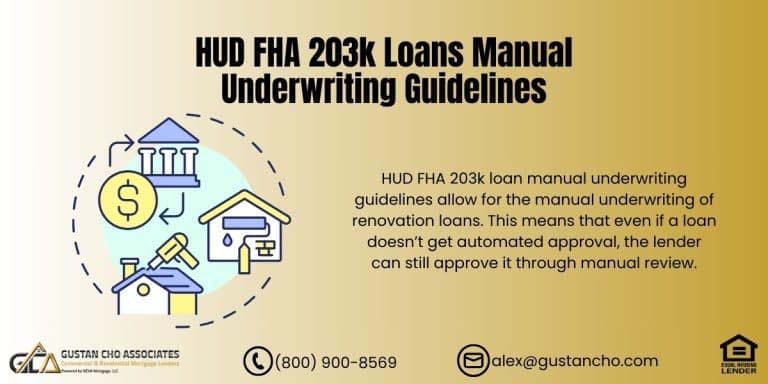In this blog, we will discuss and cover self-employed mortgage loans to buy homes. Borrowers can qualify for a self-employed mortgage with a single year’s tax return. Most guidelines require lenders to average the most recent two years of income to qualify applicants.
Some programs allow borrowers with newer businesses if they have experience in their field and their income is at least what it was as a salaried employee.
Underwriters use an adjusted taxable income to qualify self-employed borrowers, not the gross income. Qualifying self-employed borrowers’ home loans often requires additional commitment from underwriters in the form of time, energy, and persistence. In the following sections, we will cover qualifying for self-employed borrowers mortgage loans to buy or refinance homes.
Prequalify for a home loan now.
Self-Employed Borrowers Mortgage Loans Guidelines
Given the new federal lending rules and guidelines requiring lenders to verify applicants’ ability to repay before extending credit, it is easy to understand why self-employed borrowers present special challenges. If a lender chooses to comply with the new qualified mortgage rules, a self-employed borrower must also meet the 43% debt-to-income (DTI) limit.
Comparing W2 Wage Earner Versus Self-Employed Borrowers Mortgage Loans Guidelines
It is important to keep in mind that self-employed borrowers mortgage loans have similar guidelines as other types of mortgages other programs, including conventional as well as FHA-insured loans. The same loan terms—such as 15- or 30-year terms—are also available to self-employed borrowers’ mortgage loans.
Mortgage Guidelines of Government and Conforming Loans
Mortgage lenders generally underwrite their loans based on guidelines established by Fannie Mae, the Federal Housing Administration, or the U.S. Department of Veterans Affairs. Fortunately, these organizations also offer underwriting guidelines for self-employed borrowers, and lenders typically follow these standards. In addition, some lending institutions have introduced special guidelines for self-employed borrowers’ mortgage loans.
Special Guidelines for Self-Employed Borrowers Mortgage Loans
In general, the following factors apply when evaluating a mortgage application from a self-employed borrower. Stability of the borrower’s income (and the absence of significant variability in income). The area and location. Nature of business. Demand for the product or service offered by the business.
Financial stability and longevity of the business and market feasibility. Ability and potential of the business to continue generating sufficient income.
Declining income is a special concern for underwriters. You’ll need to explain a drop in income and reassure the lender that it does not indicate a general trend of falling income. This is important because lenders want know you will make the mortgage payments in the future. Marketability of the property that is security for the mortgage as a private residence is also important. Prequalify for self-Employed mortgage loan today, click here
Length of Self-Employment
Lenders typically must obtain a two-year history of the borrower’s prior earnings to demonstrate the likelihood that you will continue to receive this income. However, individuals who have been self-employed between 12 and 24 months may earn mortgage approval. This applies if your most recent federal income tax returns show that you receive as much or more income from your business as you did from a similar profession. Underwriters carefully consider the nature of your experience and the business debt load. Applicants who have been self-employed for fewer than 12 months are not eligible for loan approval.
Related> How do underwriters calculate income?
Freddie Mac Self-Employed Borrowers Mortgage Loans
Freddie Mac does allow self-employed borrowers with only one-year tax returns if the self-employed mortgage loan borrower can get approval from their automated underwriting system (AUS). Not all lenders honor this and many impose stricter guidelines called overlays. But Gustan Cho Associates will close that loan and we do not add overlays.
Related> How do underwriters view commission income?
Qualifying for a Non-QM Loan
Gustan Cho Associates has dozens of lending relationships with non-QM wholesale mortgage lenders. For any non-QM mortgage loan program in the marketplace, the team at Gustan Cho Associates also offers it.
12-Month Bank Statement Loan Program
Non-QM wholesale lenders are now offering countless non-QM wholesale lender programs for self-employed borrowers. The 12-month bank statement loan program with no income tax returns is a very popular loan program with business owners. Non-QM bank statement loan programs are available for self-employed borrowers for primary residences, second homes, and investment properties. Expect to put at least 10% to 25% down depending on your credit and the program.
Help for Self-Employed Borrowers Mortgage Loans Needing Home Loans
Non-QM loans are a great loan program for self-employed borrowers. Gustan Cho & Associates doesn’t care about the borrower’s adjusted gross income. It can be a loss on income tax returns. The monthly deposits are averaged for the past 12 months.
Lenders will use the average monthly deposit over the past 12 months is what is used as the monthly income. You cannot have any overdrafts.
Withdrawals do not matter. For example, you can make a $10,000 monthly deposit and withdrawal of $9,999 and only the deposit of $10,000 is used. It is a great loan program for owner-occupied, second homes, and investment properties.
Self-Employed Borrowers Mortgage Loans to Buy or Refinance Homes With No Tax Returns Required
In this article, we will discuss and cover mortgage for self-employed borrowers with no income tax returns required. Not every mortgage borrower qualifies for government or conventional loans. This holds true for self-employed folks, established investors, and wealthy retirees with no consistent regular income but substantial assets. There are wealthy high net worth business owners and/or self-employed folks who have negative income on their tax returns but can easily afford high-end homes. With traditional jumbo loans, it is next to impossible to qualify for a jumbo loan due to its strict guidelines.
Non-QM Self-Employed Borrowers Mortgage Loans
With the various non-QM mortgage loan programs Gustan Cho Associates offers, many can benefit from our non-QM and alternative finance mortgage programs. Whether it is full doc, bank statement loan program, asset-depletion, P and L only, or countless other alternative financing loan programs. Gustan Cho Associates is proud to have a national reputation of being a one-stop mortgage shop. Gustan Cho Associates offers a wide variety of non-QM loan programs for owner-occupant, second homes, and investment properties.
Income Taxes Is Not a Requirement For Many Non-QM Self-Employed Borrowers Mortgage Loans
Gustan Cho Associates offers self-employed borrowers mortgage loans without income tax returns required. Loan programs for self-employed wage earners are part of the Non-QM loan programs. Self-Employed borrowers mortgage loans were one of the most popular home loan programs in the nation prior to the coronavirus outbreak.
All lenders halted self-employed borrowers mortgage loans once the coronavirus outbreak broke out in February 2020. Lenders offering self-employed borrowers mortgage loans have not just ceased their operations but closed their doors permanently.
Others went bankrupt due to liquidity issues in the secondary mortgage bond markets. Gustan Cho Associates was one of the very first mortgage companies in the nation to reopen the mortgage for the self-employed borrower’s loan program. Our 12-month bank statement loan program with no income tax returns required is in full operations for mortgage borrowers who cannot qualify and/or benefit from traditional government or conventional loans.
Types of Borrowers Benefiting From Non-QM Self-Employed Borrowers Mortgage Loans
Gustan Cho Associates offers a wide range of non-QM mortgage loan programs including self-employed borrowers mortgage loans. One of the most popular non-QM loan programs is our 12-month bank statement mortgage loan program. Traditional stated income mortgages were one of the most popular home mortgage programs prior to the 2008 financial crash.
Stated Income and No-Doc Self-Employed Borrowers Mortgage Loans
Stated income mortgages were discontinued after the financial crash. A few years later the bank statement mortgage program emerged.
Bank statement loans are ideal for those who cannot verify their income the way traditional lenders require it by requesting the past two years’ W2s, the past 30 days’ paycheck stubs, and the past two years’ income tax returns.
Now with our 12-month bank statement loan program, only the past 12 months’ bank statement deposits are averaged and used as the monthly qualifying income. Withdrawals do not matter. Gustan Cho Associates is now offering no-doc mortgages and stated-income self-employed borrowers mortgage loans.
12 Month Bank Statement Self-Employed Borrowers Mortgage Loans
The following types of borrowers will greatly benefit from our 12-month bank statement mortgage loan program:
- Entrepreneurs and small business owners
- Freelance workers
- Independent consultants
- 1099 wage earners such as licensed real estate agents
- Independent contractors
- Contract wage earners
- Sole proprietors
- Gig economy workers
- Retirees
- Other workers without traditional methods of employment and/or income
How Does The 12-Month Bank Statement Loan Program Work
Self-employed borrowers mortgage loans are also referred to as bank statement loans for self-employed borrowers or Non-QM loans for self-employed borrowers: Qualified income is calculated with 12 months’ bank statement deposits. Mortgage underwriters will take the borrower’s past 12 months’ bank statement deposits and average them.
The average of the past 12-month bank statement deposit will be the number used as the monthly income for debt to income ratio calculations.
Withdrawals do not matter. For example, if the borrower makes a $10,000 deposit and withdrawals $9,000 on the same day, the $10,000 deposit will be used and the withdrawal does not matter. The borrower does not need to provide federal income tax returns.
Qualify for home loans , click here
Reason Self-Employed Borrowers Mortgage Loans Buyers Have Trouble Qualifying For Home Loans
Business owners, self-employed wage earners, and 1099 wage earners always had issues qualifying for a home mortgage due to the large write-offs on their income tax returns.
One of the largest benefits of running your own business is the ability to write unreimbursed business expenses. By doing so, the business owner pays little in taxes.
Self-employed wage earners pay taxes on adjusted gross income which is total income less unreimbursed business expenses. The larger the unreimbursed business expenses, the smaller the adjusted gross income is.
Self-Employed Borrowers Mortgage Loans: Unreimbursed Business Expenses Versus Adjusted Gross Income
The smaller the adjusted gross income, the fewer taxes paid. Being able to utilize unreimbursed business expenses is one of the best benefits of being self-employed due to being able to deduct substantial expenses and benefit in tax savings. However, substantial unreimbursed business expenses hurt when qualifying for a home loan.
Many business owners and self-employed wage earners can afford higher-end homes but until now had a hard time qualifying for a traditional jumbo loan.
Now, with our 12-month bank statement loan program, self-employed borrowers can qualify for a home loan without providing their federal income tax returns. We do not care about the adjusted gross income. The adjusted gross income can be negative and have no impact on qualifying for a home mortgage. Income tax returns are not required.
Traditional Jumbo Loans Versus Non-QM Jumbo Mortgages
Our 12-month bank statement mortgage loan program is one of the most popular loan programs at Gustan Cho Associates: It is an ideal home mortgage loan program for business owners and self-employed wage earners. Many entrepreneurs have a successful business but have a difficult time qualifying for a home mortgage. Many entrepreneurs have interests in higher-end homes. However, qualifying for traditional jumbo loans is becoming increasingly difficult. This holds especially true these days with the coronavirus outbreak and changes in the secondary mortgage bond markets
Most lenders require a 740 FICO credit score, under a 41% DTI, and one year’s reserves on traditional jumbo loans. Most lenders will not touch any mortgage loan applicants who had a prior bankruptcy, foreclosure, deed in lieu of foreclosure, short sale, outstanding collections and charged-off accounts, or other derogatory credit tradelines
Non-QM Jumbo Mortgages have much lenient common-sense lending guidelines. Non-QM mortgage underwriters are open-minded and can make exceptions if a borrower does not meet one of the lender’s guidelines or lending requirements. It is based on a case by case scenario. For example, if a Non-QM Jumbo mortgage borrower has a lower credit score but has substantial reserves, the mortgage underwriter can make an exception and waive the lower credit score. If a Jumbo Non-QM Jumbo mortgage borrower has a higher debt to income ratio exceeding the maximum 50% DTI cap but has a non-borrowing spouse with a full-time job, the mortgage underwriter can make an exception and approve the loan. Since non-QM loans are non-conforming loans, they do not need to meet any agency mortgage guidelines. It is up to the non-QM lender to set its own mortgage guidelines.
Types of Non-QM of Self-Employed Borrowers Mortgage Loans
The team at Gustan Cho Associates can definitely help self-employed homebuyers with our popular bank statement mortgage loan program with no income tax returns required. Since the launch of our bank statement mortgage program for self-employed borrowers, we have helped thousands of self-employed homebuyers realize the dream of homeownership become a reality. The bank statement loan program is for both home purchase and refinance mortgages, including cash-out refinance of your existing home. Income tax returns or financial statements are not required.
Full Doc and No-Doc Self-Employed Borrowers Mortgage Loans
Gustan Cho Associates offers both full doc and 12-month bank statement mortgage programs as well as full doc non-QM loans. Borrowers can qualify by using 12 months of personal, business, or co-mingled bank statements.
No federal or state income taxes are required, therefore 4506T is not required. The 12-month bank statement mortgage loan program is available for owner-occupant primary homes, second, homes, and investment properties.
There is no maximum loan amount. In general, we like the loan amount to be capped at $3 million. Loan sizes over $3 million will need to get approval from the credit committee and will be reviewed in a case-by-case scenario.
Asset-Based Self-Employed Borrowers Mortgage Loans With No Income Tax Returns
Gustan Cho Associates offers asset-based mortgages on investment properties. It will be underwritten based on the cash flow of the subject investment property. There are no maximum amount of financed properties being financed. There are no income tax returns and/or financial statements required.
Apply today for your best deal about purchase a home loan, click here










